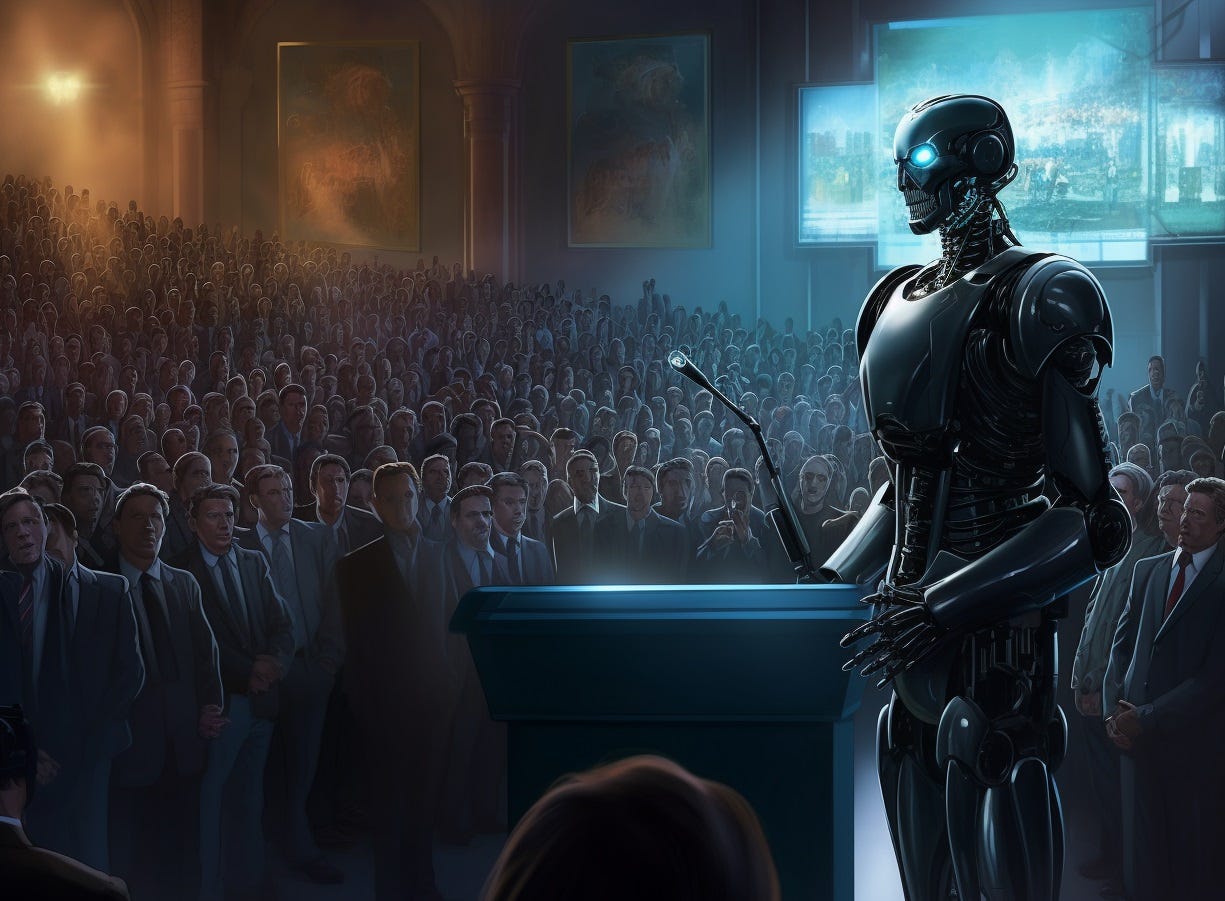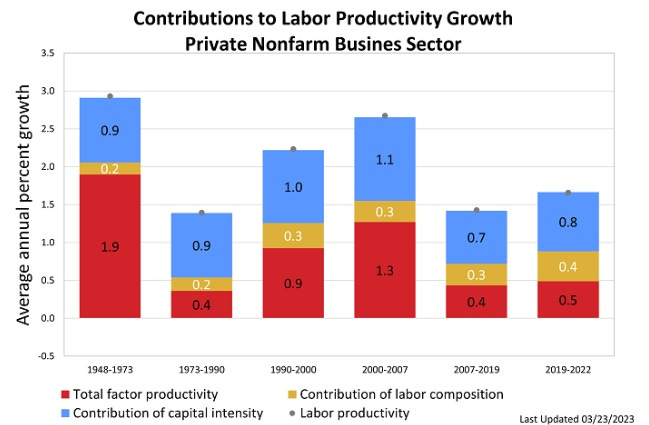😨 We fear AI. That's a problem.
Machine learning could greatly boost productivity growth and our living standards
Quote of the Issue
"Science fiction shares with science a most important driver: a fascination with the possibilities of existence." - Lawrence M. Krauss, forward to Hieroglyph: Stories and Visions for a Better Future
The Essay
😨 We fear AI. That's a problem.
Before I deep dive into the recent productivity data, I want to first present some different numbers, ones to keep front of mind as you read the rest of the essay. The films The Terminator, Terminator 2: Judgement Day, The Matrix, and Avengers: Age of Ultron have a combined, inflation-adjusted domestic box office of $1.5 billion, or $371 million per movie on average. These are the films I see frequently mentioned in stories about recent advances in AI and robotics. What they all have in common is the negative depiction of AI and robotics. Indeed, evil machines are the driving force of the stories.
And as for films about machines as the good guys (or are treated sympathetically) who are driving the plot? Well, the best I could come up with — maybe they are mentioned occasionally — are A.I. Artificial Intelligence, Her, and WALL-E. Combined domestic grosses: $483 million, or $161 million per movie on average.
The miracle of getting more from less
Now a bit of economics: Imagine a world where the quarterly US productivity numbers received the same amount of analyst and media attention as the monthly US jobs report. I understand why that’s not the case. Productivity data is both subject to large revisions and reflects long-term changes in the American economy.
On the flip side, though, productivity growth is pretty darn important. As Nobel laureate and New York Times columnist Paul Krugman famously put it, “Productivity isn't everything, but in the long run, it's almost everything.” When workers become more productive, businesses can afford to offer higher wages to their employees. This increased income leads to improved living standards, better quality of life, and greater purchasing power.

Here’s a good example of how tech, including AI, can boost productivity growth. From “A.I. Can’t Build a High-Rise, but It Can Speed Up the Job” in The New York Times:
Artificial intelligence, the technology that powers chatbots like ChatGPT, won’t be assembling apartments or erecting stadiums any time soon, but in construction — an industry stereotypically known for clipboards and Excel spreadsheets — the rapid embrace of the technology may change how quickly projects are finished.
Drones, cameras, mobile apps and even some robots are increasingly mapping real-time progress on sprawling job sites, giving builders and contractors the ability to track and improve a project’s performance.
“Forget about robots building a skyscraper,” said James Swanston, chief executive of Voyage Control, which makes project management software for construction sites. “It’s a more fundamental thing, getting the data you need and then using it better.”
And how has productivity growth been doing of late? It’s a little tough to know because pandemic-related distortions have made a volatile statistic even tricker to track and analyze.
Interregnum: There are three key factors affecting productivity growth. Higher economic output can come from a) higher skilled or educated workers, b) workers having more or better equipment to work with, or c) better or new production techniques or technology. The third factor is called total factor productivity.
As I have noted previously, labor productivity in the nonfarm business sector jumped at a 3.7 percent annual rate last quarter, the biggest increase in nearly three years. And economists at JPMorgan observe in a recent report that “if the early tracking of GDP growth in 3Q … is anywhere close to correct, then productivity growth will likely be strong again in the current quarter.” What’s more, that strong showing lifted the growth rate over the past year to 1.3 percent, “the first time that metric has been in positive territory since late ’21,” according to JPM.
The pandemic and productivity
Of course, this surge comes after a slump last year … which came after a surge during the pandemic. (I told you these numbers were jumpy, especially during a big macroeconomic event.) Here’s how JPM explains things: During the pandemic, we saw that when it came to job cuts and people choosing not to work, those with lower skill levels were typically affected first. This resulted in a workforce where those who remained were generally more skilled. “The resulting workforce was essentially an army of officers.” This shift toward having a more skilled workforce had a significant impact on how much our productivity grew in 2020, contributing to a 1.7 percent increase. But in 2021, that composition trend reversed as companies started hiring, and people returned to work.
Are the more recent figures still influenced by the pandemic? JPM economists doesn’t think so. For example: The average number of hours worked, which was higher when companies struggled to find enough workers, has now gone back to levels similar to before the pandemic. “So it would seem that the first-half figures, when productivity increased at a 1.3% rate, is a relatively clean read. It’s also very close to the 1.4% average annualized pace that prevailed between 4Q19 and 2Q23. While not great, these figures are above the 1.0% average annualized pace that prevailed in the prior decade.”
“Not great.” No, they are not. And I wonder: If the above facts were more widely known and understood, would we be seeing the following downbeat poll numbers about AI? So depressing (via Vox):
A whopping 72 percent of American voters want to slow down the development of AI, compared to just 8 percent who prefer speeding up, according to new polling from the think tank AI Policy Institute. The poll, conducted by data analytics firm YouGov, surveyed 1,001 Americans from across the age, gender, and political spectrum: 42 percent of respondents affiliated themselves with Donald Trump and 47 percent with Joe Biden. The racial breakdown was a bit less representative: 73 percent of respondents identified as white, 12 percent as Black, and 7 percent as Hispanic. Most respondents did not have a college degree.
Still, who’s surprised at those numbers given the plethora of news stories about how generative AI models such as ChatGPT and Midjourney might enslave humanity after taking all our jobs? Of course, American society has for years been soaking in dystopian sci-fi where AI is the ultimate villain. Lots of movies about that theme, but not so many about the opposite.
Which leads me to wonder: Would we be seeing such dreary AI poll numbers if we had a more tech-positive culture where the importance of productivity growth driven by tech progress was more widely and deeply understood? That said, I’m not going to count on more positivity from either Hollywood or the media. There’s a better chance that AI-machine learning broadly will boost productivity growth and wages. And there’s some good news on that front in terms of the business investment needed for an AI-driven productivity boom. Again, JPM:
One encouraging possibility is the scope for artificial intelligence to supplement the productivity of knowledge workers. The investment prerequisite for the IT boom of the ‘90s was business investment in information processing equipment. In any prospective AI boom the investment prerequisite will likely be investment in software. So far, the prospects in this cycle look promising. … Productivity forecasts are subject to more than the usual uncertainty that pertains to economic forecasts. However, if we are to see an AI-driven resurgence in productivity, the business sector is already doing its part.
Now it would be great if our culture did its part, too. If AI is a significant general-purpose technology, there will be disruption — and pushback to that disruption. Images of a better tomorrow would be incredibly helpful.
Micro Reads
▶ A Letter Prompted Talk of AI Doomsday. Many Who Signed Weren't Actually AI Doomers - Will Knight, Wired |
▶ The Desperate Hunt for the A.I. Boom’s Most Indispensable Prize - Erin Griffith, NYT |
▶ Woolly idea: start-up’s wild plan to resurrect the mammoth - Hannah Kuchler, FT |
▶ A Rare Look Into the Finances of Elon Musk’s Secretive SpaceX - Micah Maidenberg, Corrie Driebusch & Berber Jin, WSJ |
▶ How Far Is Labor Force Participation from Its Trend? - Andreas Hornstein, Marianna Kudlyak, Brigid Meisenbacher & David A. Ramachandran, FRBSF Economic Letter |
▶ Elon Musk is killing ‘Environmental Twitter’ - Justine Calma, The Verge |
▶ The sceptical case on generative AI - John Thornhill, FT Opinion |
▶ A Letter Prompted Talk of AI Doomsday. Many Who Signed Weren't Actually AI Doomers - Will Knight, Wired |
▶ A race for autopilot dominance is giving China the edge in autonomous driving - Zeyi Yang, MIT Tech Review |
▶ The scourge of climate doomism - Pilita Clark, FT Opinion |
▶ Using the Oceans to Help Capture Carbon - Prachi Patel, IEEE Spectrum |
▶ Is the A.I. Arms Race Unsustainable? - Nityish Phwa |
▶ Top Google AI experts pick Japan to set up on their own - Madhumita Murgia, FT |
▶ Why Industrial Policy Fails - Michael R. Strain, Project Syndicate |
▶ Debunking the Myth of Swedish Socialism—Again - Johan Norberg, CATO Unbound |






You appear to have left out the the filmic AI that bears most closely to our true concerns. HAL, the character in 2001 A Space Odyssey. HAL was the human astronaut's partner who kept their environment in balance, who managed their technology, but when he sensed a concern for the mission, he was compelled to react. But then, human ingenuity prevailed.
I'm a social worker/normal person who enjoys art and reads the news. Here's my perspective on why AI is terrifying and should be slowed, for what it's worth.
From what I've read, the creators of this technology are pretty outspoken about envisioning a world where "work" is largely eliminated. I think most people in the real world are aware that while sometimes unpleasant, work is where many humans find meaning, purpose, motivation, connection, time away from home, etc. I'm not sure what these folks think will happen in a society without work. People will take up macrame? Wait, "we" probably want the robots to do that too. I'm guessing it's more likely we would see skyrocketing levels of addiction and suicide.
We've also seen, in these early stages, that AI is capable of creating art--music, prose, poetry, visual art. It's not great, but the creators of the tech ensure us it will get better. As if that is something, somehow, we should be wanting and looking forward to. Personally, I can't think of anything more depressing.
Then you have the many outspoken people who, unlike me, know what they're talking about, and are terrified of AI and are urging someone to step in. One guy said he's literally thinking of it all the time, it's that terrifying to him.
And somehow, it's also going to extend our lifespans significantly. It's like they want to create a terrible, nightmarish existence for everyone and then force us to live forever in it.
This stuff has literally kept me up all night and made me question whether it was the right decision to bring children into a world where this stuff exists.
I guess considering all of these factors that swirl around my head all the time, "productivity" doesn't make the list of factors I'm considering. I doubt it does for most people. You said something in the article about increased productivity enabling business owners to raise wages for workers. Does that sound like the world we live in? I've never heard of it happening.
So yeah....I guess let's make some movies where AI is shown in a different light. Because personally, as a normal person who enjoys humans, I have no idea why we would want this.